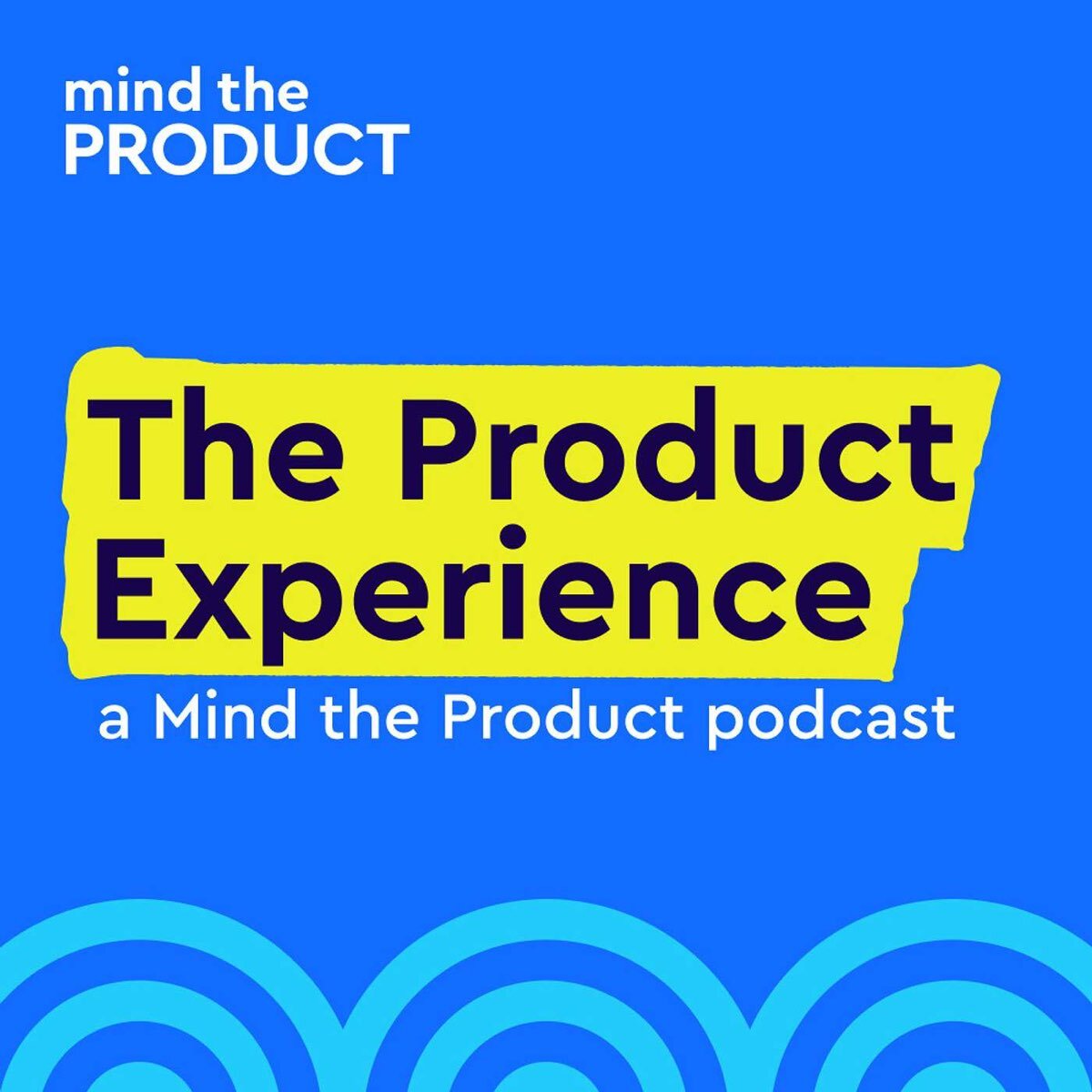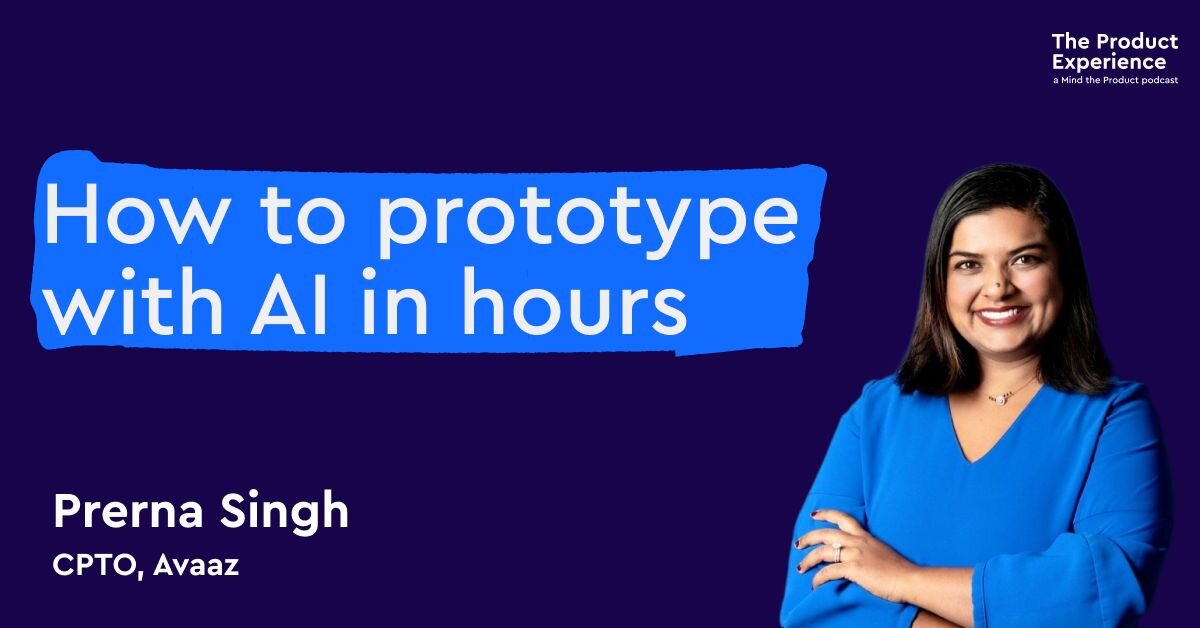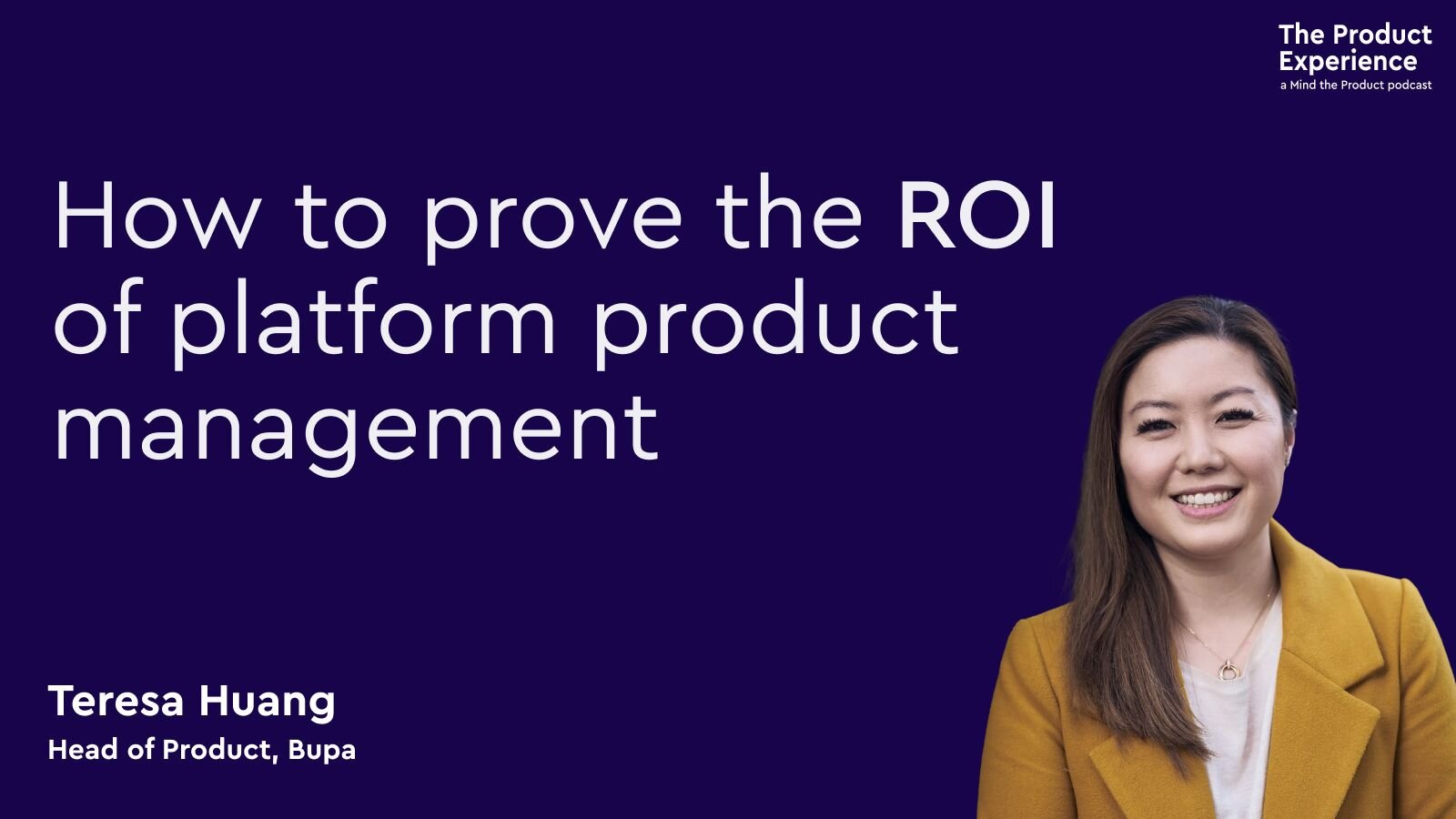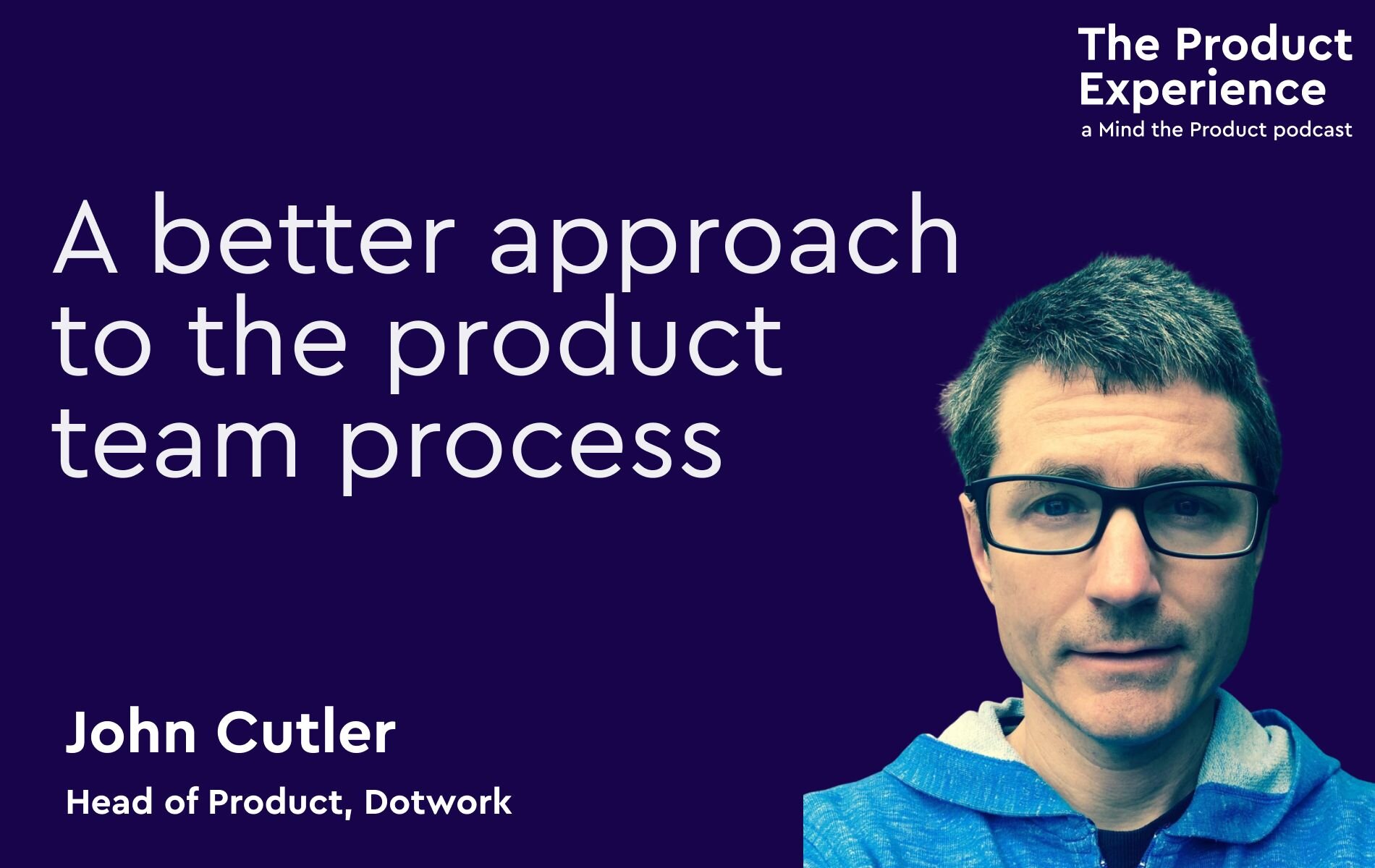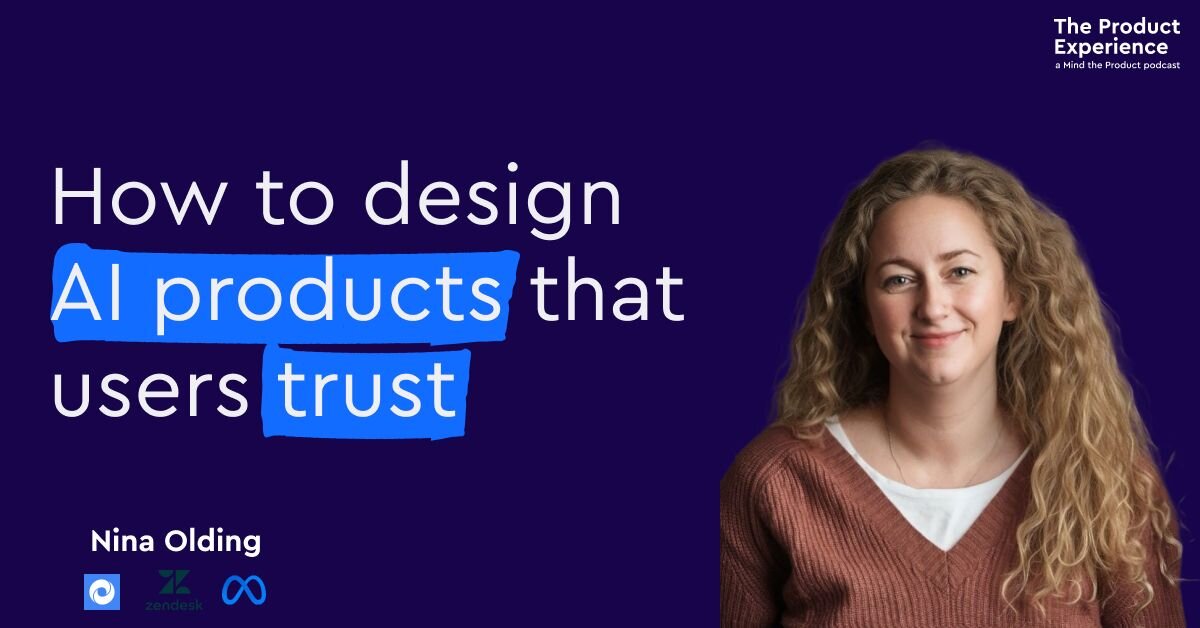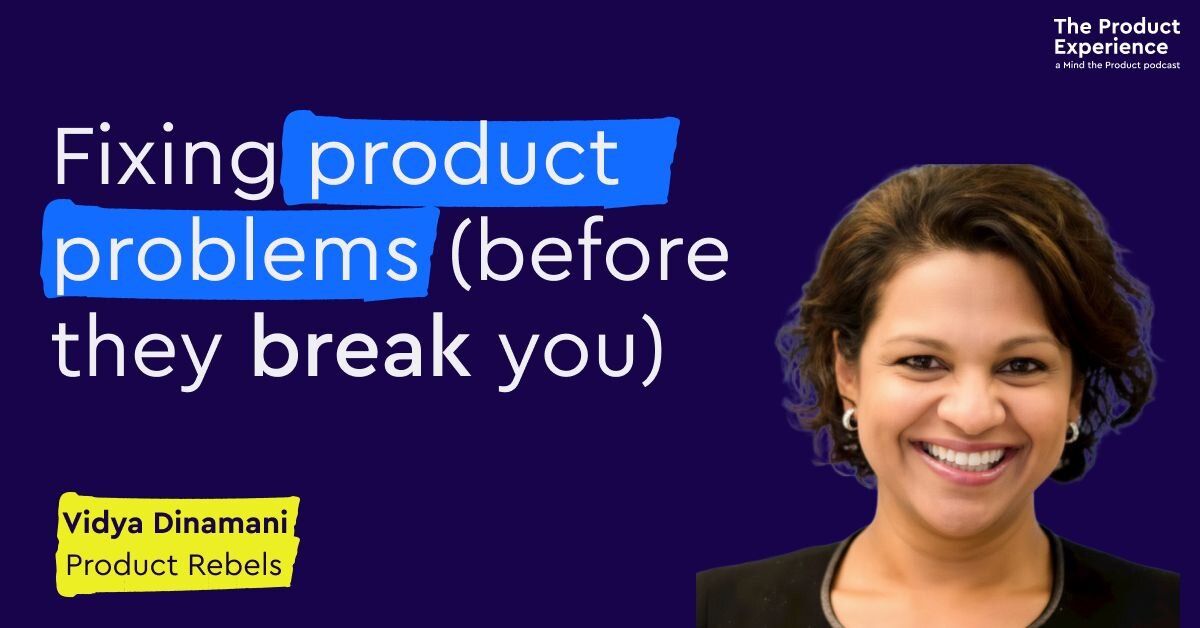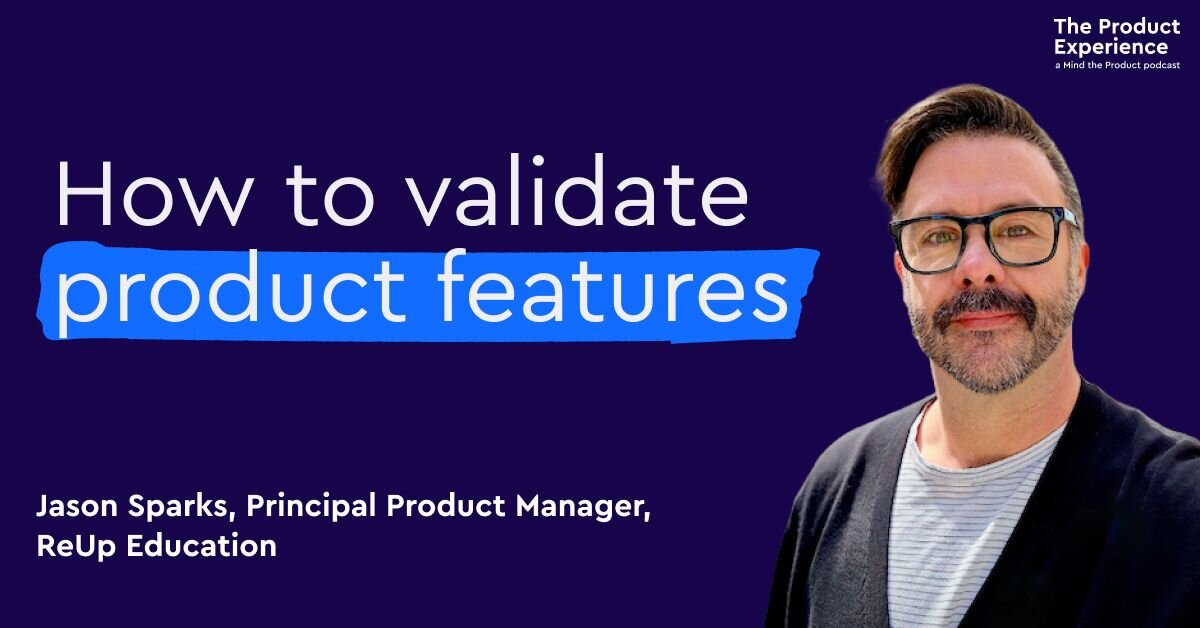In this week's episode, we sit down with Alex Watson, Product Director at Spotify's Core Experience. Together, we unpack the tools and mindset necessary for anyone navigating a career in product management. We delve into the critical aspects of understanding your motivation for career progression and the unique benefits that different levels of seniority hold.
Featured Links: Follow Alex on LinkedIn | The Wired Jester | 'Managing Internal Communications for Big Projects' feature at Mind The Product | Alex's thoughts on 'Self development and Career Progression as a PM in Spotify'
#mtpcon London 2023 is set to be an inspiring event. The speaker line-up is shaping up nicely and tickets are selling fast. Join us for our smash-hit conference on 20 October. Hurry and get yours ticket today – https://www.mindtheproduct.com/mtpcon/london/conference/
Episode transcript
Randy Silver:
Hey everyone, it's Randy Silver, co-host of the Product Experience Podcast. Lily couldn't make it this week, so you've got me flying solo on the intro, which means all of the pressure of making it both amusing and informative is on me. Huh, Okay, let's get informative out of the way first. Our guest this week well, MY guest this week is Alex Watson. I first saw him do a talk at London's product tank way back in 2016, where he talked about managing large, complicated projects. He's since gone on to do even larger and more complicated ones, leading to his current gig as a product director on Spotify's Core Experience. He's here today to talk about career progression for product people and finding the story of your career. Okay, now I need to do the amusing part of the intro. Let's see. Okay, I got it. I got this from the Dad Jokes channel on a slack group that I'm in. If you ask Rick Astley for his copy of the movie up, he cannot give it to you, as he is never going to give you up. However, in doing so, he lets you down, thus creating the Astley paradox. Lily, come back soon, Save me and everyone else from this On. With the show, the product experience is brought to you by Mind the Product. Every week on the podcast we talk to the best product people from around the globe.
Lily Smith :
Visit mindtheproductcom to catch up on past episodes and discover loads of free resources to help you with your product practice. You can also find more information about Mind the Product's conferences and their great training opportunities happening around the world, and online.
Randy Silver:
Create a free account on the website for a fully personalized experience and to get access to the full library of awesome content and the weekly curated newsletter Mind. The Product also offers free product tank meetups in more than 200 cities. There's probably one near you. Alex, thank you so much for coming on the podcast this week. How are you doing tonight?
Alex Watson:
I'm good. It's nice to be here, Andy.
Randy Silver:
If you are a London product person then I'm sure you know Alex. He's spoken at lots of conferences, he's done lots of talks at product tank and things like that. But for people who don't know you, alex, can you give us a quick intro? What are you up to these days? And, by the way, how did you get into product in the first place?
Alex Watson:
Yeah, sure, so I work for Spotify at the moment and I'm one of the product directors for the core experience. I've done that for the last couple of years and before that I mostly have done news products and that's probably if anyone's heard of me. That's kind of the stuff that I've talked to the minor product crew about. I worked at the BBC for five and a half years as the head of product there, before that at the Telegraph and then before that I actually got my start doing iPad apps for a magazine company called Deniz and I was really lucky to be supported by my minor product early on. There are a lot of great news product managers in London and that's kind of how I find my minor product community and, yeah, that's how I really got my start in it Fantastic.
Randy Silver:
So we're going to be talking today about careers in product and how you self define, how you grow, how you get better at it to a certain degree and also, from the other perspective, how you manage the careers of the people in your team, and you shared something with me ahead of the podcast, a presentation you did where you asked two big questions right at the outside, and I'm curious. I want to know why these questions specifically? So the first one is are the senior people in your business smarter and happier than you? And the second one has anyone ever actually finished their roadmap so why these? questions.
Alex Watson:
Yeah, it was a talk I gave during the first year of the pandemic, which was obviously a very strange and intense time, and I'd been asked to do a talk about career progression Because I think at that point I'd probably been going about 10 years. And I'd really gone all the way up from being like our product manager on an app to someone running a small team and then like a big team at the BBC, and then to just modify where I'm really working with. You know a lot of teams on a lot of core parts of the product. So I've done this kind of progression and it was a case of perhaps being asked to think through what advice would I have for people, and one of the things about progression is what's right for each person is quite individual and that makes it quite hard to give the advice that people often want to know am I doing enough? Am I progressing? When am I going to get to that next level? And it really made me think about, well, how do you measure a product career? What counts as good? And you see it as sometimes in product slacks and discussions, which is like designers have got like their portfolio, developers have got their GitHub. You know what? What do you do as a product manager? What do you put together as, like, the story of your career? And particularly in big places and you can spotify being one of them if you want to go for a promotion you know there's quite a well defined path that you actually have to put together like quite a bit of evidence. So what is it that you put together as a product person? And that led me to these two questions. And the first was really about you know what is the reason that you're chasing progression. Is it because you think that, like, as soon as you get to that next level, you're going to be two x happier and two x more fulfilled? Because I think some people don't stop and think about that because actually the levels are quite different and there are things that I don't get to do in my job now that I missed from the, from the previous levels. And then the second one was given that you never finish your roadmap, just sort of having a list of here's the stuff I shipped doesn't feel very satisfactory as this is my product career. So I was really thinking about those two questions. One is what drives us to seek out progression and how might we therefore think about his progression? Good, and the second flip side is okay, you're going for progression. How do you illustrate what you've done so far? Because it is much harder for product people. I think as an engineer, as a developer, it's a bit easier to say this is the stuff that I did. I think it's much harder for product folks.
Randy Silver:
In terms of progressing as a product person in the places that you've been, has it always been into a management role or is there also an IC track, an individual contributor track, to be more senior, more complex problems, things like that with staying a pure hands on product person, but in more of a distinguished product manager type role?
Alex Watson:
Yeah, that's super interesting, but I don't think, frankly, when I was progressing, that there was much of a concept in the UK of this what's now generally called like a principal product manager or a product fellow or a staff product manager. It definitely existed for engineers as soon as I was working with engineers there was always the concept of oh, him over there or her over there, they're the kind of, they're the, they're the principal or they're the staff engineer. I think it's taken a long time to come to product and I'm really glad that it has. It's definitely a thing we do at Spotify and I'm sure there's plenty of other listeners who work in companies where that is an option, and I think I do. I do get to go hands on in my role at Spotify because it's quite a detailed or intated job. So even though I'm doing a management role, I get to kind of get into the detail, which is cool Because I think, certainly perhaps at the BBC, where it was very managerial, I definitely missed that creative part of it. Like I always think of productors, there are two halves to the job. It's in the job title. There is the product part, which is more creative, it's more free flowing, it's more about you know they're getting into what is the thing we're making. And then there's the management part, which is more a classic kind of not quite a bureaucratic job, but it's a job of meetings, of notes, of slide decks, and I think keeping those two things in balance is one of the things. That, for me, is what makes for a good role, and I think if you are thinking about progressing, you probably need to make sure both parts of that are satisfied that you've done a good job on showing you can handle the management parts of what you're doing and a good job at the product parts, and I think that probably exists at all levels. I'm not sure there's a. You know you're doing management at most levels in a product job, even if it's not line management. You know, even when I was doing my very first product job, you've still got the couple of developers, a designer, who are going, okay, what's the top stories that we're going to work on today? And so you're still you're still kind of driving other people's decision making, I think, even when you're in a role that doesn't have formal line management.
Randy Silver:
Yeah, I've got. A friend from years ago said the type of jobs we do, you either need to be comfortable leading or following, and that's okay, but if somebody else isn't leading, it's get out of the way. I'm going to do it. And sometimes people talk about being the CEO of the product, which we all know is crap, but that's besides the point. But the idea that you can lead from behind, you can facilitate, you can let other people have great ideas, but that is still a way of leading. It's making sure that there is leadership within the decision making in the team.
Alex Watson:
Yeah, and if I think about how the principle role works, it is a leadership role. It's a leadership of, like, a domain, or its leadership of a problem, its leadership of a particularly difficult kind of area or project that we're applying it to, and I think that's a very valid part of the product experience. So I'm very glad to see it being recognized. And I think, you know, if I was running my career over again or if I was 15 years younger, maybe I would stick more to the IC path for longer than I did when I was kind of developing my career.
Randy Silver:
Let's go back to getting ready for that promotion. One of the things you mentioned a moment ago or a few moments ago actually was something that you said the story of your career and telling it. And I've been consulting for the last few years and I really haven't updated my CV in quite a while, but I know at the top of it is a list of bullet points of accomplishments and I think that's one of the things you said. That may not be the best way of telling your story, so what is the right way? What do you recommend?
Alex Watson:
Yeah, so there's a few interesting things there. So I'm sure people have become familiar with when you do your CV. There's this temptation to I'm going to put like a little profile at the top, I'm going to write this little story, and I think LinkedIn kind of always asks for it as well, and definitely as a hiring manager, when you see a good one, you're like, ah, this is yeah, I really get it. Because you know, if you just see this kind of chronic reverse chronological list of all, I was here and I managed that, so we improve Y by 10%, what have you? That maybe doesn't tell you what the story is, and so that is a good place to start. I think, if you can get to a point of, what would that first paragraph kind of say on your CV? Does it say that you're kind of I don't know a detail obsessive PM who is really great at resolving kind of conflicts between teams, building internal tools or something like that? Or does it say you know that you're a PM who is great at exploring kind of new opportunities in new sectors and you've driven kind of innovative new solutions for your companies in the past? There's this sense that I think how should your CV be read by someone Because ultimately, particularly when you're applying for new jobs, it is kind of a conversation like when you're reading the CV as a hiring manager you are trying to get a sense of who is the person here, like a CV really is just to get you in the room or in the Zoom call for the interview. That's really what it's for Once you're in that process. Lots of other things are far more important than the CV. So I think, take that opportunity to sort of have that narrative In terms of what I was then thinking about. Certainly, early in the pandemic, I guess, like a lot of people, I had those moments of self reflection and looking around me and thinking, oh, this is a, this is a point to kind of look back on your life and sort of reflect a bit. I do think and I sort of said this earlier it's tough for product to tell the story Because you know the fact is and a lot of the talk was about this is a lot of the work we do doesn't last. That is the nature of digital product design less, slightly better, I think, because it can be preserved. I think you know if you, if you are working on a product. It's probably going through iterative changes, right, we're shipping lots of product. Lots of product changes all the time. So it may well be that what you worked on even a year ago like if I look at, say, the BBC stuff now, it's pretty different to some of the stuff that I worked on. And if I went back to, say, the Telegraph, where I worked eight, nine years ago, that's really quite different and it's no longer the thing that I ran and it's no longer the strategy that I ran. And I really started to think, well, okay, then how do you talk about what you've achieved? And some people would say, well, it's all about the people, and that's kind of true. But actually at a senior level, when you go, often there's a restructure. So this was, this was the case of the BBC. They changed quite a lot after I'd gone Because they wanted to execute the strategy in a sort of different way, and so it's not even really true to say that that's my team and I'd set that up, and the processes are different as well. So you're kind of like well, what, what, what remains, what lasts, what is the core of what you've achieved? And that's when I was drawn to this concept of the narrative and of things like the overton window, which which is this really interesting concept of how you change, I guess what it is that people consider the done thing or the acceptable route or the framing of a problem, and it drew me to concepts like that that maybe that's what a product managers career really is measured in is for want of a better word I guess the transformations that they have affected.
Randy Silver:
So I had a boss probably that midway through my career who was really instrumental in changing the, the, the tack I took, and he pointed out in a review at one point he said Randy, you've done a really good job, but the way you'd fix the problem is by putting yourself, making yourself, instrumental to the success of it. You've you've done the hero role on this and I can't remove you from that role now and put you in something else. So your job is actually you're looking at the wrong way. You need to reframe it as changing the system and transforming it so that other people can do things, or that it's done with fewer people or whatever, so that you can then go on and tackle the next problem. And the next problem, next problem and I like the way he really changed my, my philosophy and the dynamic, and it sounds like that's some of what you're saying is the transformation of changing the way people approach things, changing the nature of the problem.
Alex Watson:
I think that's that's right. Yeah, I mean definitely early on in your career. You want to have a solid record of shipping some stuff and that stuff having real impact, like it's perfectly fine if you are in the first years of your career to go. Well, I led on, you know, a new sign up component that increased conversion, or I helped refactor the way that teams upload XYZ and we've made it a little bit faster, and you definitely need to be able to always do that as a PM is talk about we ship this thing and this was the impact, and I always look for that when I'm interviewing. We always try and unpack some stories of you know. Tell me about something that had a real impact when you've solved a problem in an innovative way, and you definitely want those stories as a PM. But, of course, often that stuff is superseded. It's then changed, the business pivots strategy, so it becomes a little bit disconnected. It's no longer current or best practice, it's no longer quite as impactful as it, as it once was, and so then you probably want to. The next level is more what you're talking about, which is we. Yes, I was helping the team do our responsive refactor of our website, or I was helping the team relaunch the app or expanding to a new territory. But what was important was the way that I took them from being reactive to proactive, or it was the way that I took them from being project focused to more product focused, or I took us from being, you know, behind the competition to in front. And there's this sense of there's a story now happening of like actually, the transformation is the more interesting thing, yeah is this sense of we went from something to something else and it's that sense that the product then is in the business of transformation. And even if that's no longer the case, you know you might say, well, I was responsible for the company launching in this country, even if they no longer operate there, even if they no longer have an app strategy and they've gone full web, even if they, you know, completely pivoted or been bought by another company. And that transformation still lives on, both in your approach, in the example that you might be giving to someone way, or the answer of arguing for progression or a new role, but also, I think it lives on in the people that you work to it, this sense that you moved on their expectations. You showed them that different approaches and different results can be possible. I remember one time we worked with the telegraph and it was pretty clear, as we all prepare, you know I would be in this big process there of response, of relaunch, and I knew editorial tool, and I came about like a large change in the business side. That meant that we were gonna what are you gonna leave? And I'm gonna change the technology approach. I remember saying to one of my pms he was really cut up by what are they gonna do to my product? And I was like first of all.
Lily Smith :
The name yours, right business pay us to do something.
Alex Watson:
We did something great and they're gonna have it now that's theirs, but, like what we did was you know, what she did was really deliver something that was A lot better, a lot better than you would have thought was possible within those constraints, like it really busted through the constraints of what we thought was was possible in terms of product quality, in terms of innovation, in terms of problem solving. I always thought that that was just such a valuable thing, that it was that moving the conception of what that company or what that group of people thought they could do. So that's the concept, I guess, of the transformation of the story, aspect of progression.
Lily Smith :
Randy, what's the most effective way to learn from the best in the industry? Connect with other pms and sharpen your skills.
Randy Silver:
Why really you must be talking about mtp con london happening this year on the 20th of october.
Lily Smith :
You know it, and this year's lineup of speakers is shaping up nicely we have tim harford, behavioral economist, award winning financial times columnist, data detective and bbc broadcaster. Heat that's all of those things is just him plus the legend, that is mark abraham, product director at back base.
Randy Silver:
There's also randy psidu, who's the former cpo reliance health, and clear woodcock is the director of product for machine learning at mozilla, and many more, including a great friend of this podcast.
Lily Smith :
That's right. And don't forget workshop day on the 19th of october. There are seven full day in person workshops led by experienced product managers who share their secrets and tips for success.
Randy Silver:
And finally, there's the leadership forum, an exclusive event for senior product leaders, with carefully curated speakers, guests and delicious food.
Lily Smith :
So grab your tickets for mtp con london today. At mind the product dot com forward, slash london.
Randy Silver:
OK, so that's. That's really interesting. You, the perspective is a real problem with this because you've got the perspective of it's my product. I've been working on this thing for so long. I spent all my waking hours thinking about this thing and you know you may find a five million dollar opportunity with it and say why aren't they funding it? But you know that the person across the hall has come up with a fifty million dollar opportunity and that's just, and there's nothing wrong with yours, is just that one makes more sense, and it just has been speed. Your product area isn't going to bear as much fruit right now, so yeah, but so, and then we also live in a world where we're generally judged on things like, ok, ours. So how do you move from that, which is binary in terms of the KR side of it anyway, or you know it's reduced to headlines and numbers and bullets to finding something that is actually the thread of your story? How do you, how does someone go about that?
Alex Watson:
It's a difficult question because I see this sometimes when I'm interviewing is often the chaos makes sense really within the company's context, but they're pretty difficult for someone outside to understand or perhaps to appreciate what was hard. You know, if you're working within particularly a big company context, the chaos probably ladder up to quite a peculiar or specific view of its own market. I'm in particular, think the digital companies where often we're seeking to do disruption or seeking new approaches. The view of the market is often not a straight forward. We charge x, we make ten percent profit and that's that's what. That's how the business works. You know business models are very complex these days. So I really sympathize with pms who are trying to narrate what it was they did, because they've got to get across. Well, this is the impact I had and this is what matters. And actually often you know the okay are complex, the business model is complex, or sometimes that they're not well written and not straightforward. So I think part of it is reflecting on what you as a PM are drawn to in the way that you solve things and that probably takes a little bit of them, a few opportunities to be able to observe, because you need to think about how you yourself have tackled this role in the previous role. Maybe you can look across projects and things yourself. What kind of problems are my like? Am I? Somebody comes in and do kind of what you described, which is I put myself in situation and I get in with the team and the trenches and I drive it and that gives you the sense of okay. Well, the story there is. You know you're quite dynamic, that you're on the front foot, but that maybe you're not. You're trying to learn a bit more about influencing through other people. So some of it is the core of it in fact, I guess is self knowledge and is reflecting a little bit on what it is that you bring to your approach. And I think that's one thing that's very Core to the product job because it's so different and you definitely see this when you interview. You see how different PMs are, different companies are. So turn that into an advantage for yourself because the product management is not stamping out people who all you know it's not like I don't know you're certified by some central body or that we all go to and do two or three of the same university courses and that's where everyone comes from. It's quite A varied in industry and you can approach your job in a way that suits your company, that suits your, your, your product and your product challenges. And so I think part of it is reflecting yourself on. What am I drawn to? How do I solve those problems? What's the common thread? And again, like if I'm writing that top paragraph at the top of my CV, what is it that I call attention to? What is it that matters to me? And from that I think you can get this sense of this is what I want to talk about. This is the core of how I solve problems and what I think is an interesting transformation that I want to see happening.
Randy Silver:
So, alex, one of the problems we have is there's things like recency bias, success bias. We forget things along the way and it I've known people who, when I've done reviews with them, they forgot some of the amazing things that they had done along the year that I later had to remind them about. Nice problem to have you have too many good things, but how do you make, how do you arm yourself and make sure that you're keeping track of this so you have good stories to tell and you can really get the whole arc of them?
Alex Watson:
This is a great question. It says hopefully this is probably the most practical part of what I'll say. So I learned when I first became a manager, went through some training and it was all about recency bias and the trainer said Take notes about what your staff do throughout the year. So when you do the review, you're not just going up what has he done last three weeks, what she's been up to recently. You can revert, you can invert that and as an employee you can do a lot to record what you're contributing and what you're achieving. So, personally, one of the things that I do is a weekly retrospective. I look at a little bit of time on Friday at the end of each week. I will just do something in the notes file on my phone what's going well this week, what's going less well, and then kind of the lessons or the things that I think I want to reflect on for this week. And it's very good pointy is very quick, but I've done it for the last Three, four years and so I have these long no files that just week by week, this is what's happened and what it means is that you've got a real treasure trove of. This is what happened at the time. This is what you felt was important. This is what felt like a win when you finished on Friday, what felt like a real win this week. I got so and so to buy into this. The test result came back and it was. You know, I really got alignment with these people who Previously have been on board. What went less well and that's also interesting sense of I really. You know, I wasn't prepared for that meeting and it didn't run in the way that I thought it was gonna run. You know, I moved to this new team and that has a panned out and it's just a real moment to do that reflection. And part of this is in a is a bit of an agile practice because it's basically a self retro. Some of it you can ground and kind of more. You know, kind of a more mental health techniques about sort of taking moments to build a reflection on yourself and having space to tell your own story and in the talk. You know, a lot of this is based on this concept of Biography and thinking about the story of a life and ultimately that comes from taking some time to just reflect on things. There's a really nice Line from Virginia wolf, the writer, where she's talking about her diary, and she was a very avid diarist and she said she always felt she missed a couple of days of writing the diary, that it was like leaving the tap running in a sink without the plug in and it was just what is experience was just draining away, and it's a lovely sort of metaphor. But I think it's very true to what you said, that people forget. We all forget. In a particular product manager, you're doing Hundred meetings a week, is endless zoom calls and you're always running to the next thing. So don't forget what's actually happened. Make a record of it, reflect on it and you'll be very surprised because when the time comes to do something more formal, like a promotion or A CV application, you'll be able to go and look at this stuff and go well, okay, there's. There's a lot of raw material here that I can now say.
Randy Silver:
That's great. I think we're running low on time, alex, so I've got one more question that I wanted to ask. It's about the Spotify model, but not the Spotify model that people have talked about in the past. This is different one that that you introduced me to the fifty, fifty rule. Can you tell me a bit about that, because that sounds like a really good one, and maybe it's when you actually use it Spotify these days.
Alex Watson:
Yeah, I mean, okay, good, this is good, but this is the one I'm being asked about. So this came from about a year in with my manager, who is a very, very, very acute judge of a character and approach is, as you'd expect from someone who's fairly senior, very good, kind of like drilling into a situation and have you was to be successful. You want to broadly have a 5050 split and 50% of your time is Kind of day to day running of your department or, if you're early in your career, your team. So it's the basics of delivery, of check ins, of responding to messages, preparing for meetings, you know, creating decks. That's what's up with. The 50% is just the stuff that's kind of the regular progress of stuff. That's this kind of reasonably well run projects or teams. The other 50% is the number one thing that you want to solve. That is what you would call like you are a high leverage. You have high leverage back game this problem. So you are picking something that you, in the role that you're in weather, that's, a director or a head of or a PM. This is a problem that you apply yourself to. You High leverage on getting this problem so and you dedicate this 50% of that time to getting that done. And so, whether that is something really specific, like how does the share flow resolve, or like what happens with this API, or maybe something strategic, what are we going to do with that LLM thing? You know what is our approach to this new hardware platform, but you pick this thing and you go. I am going to really move this problem on. I'm going to get it from being on fire or crunchy or difficult to the other 50%, to the point where it can now just be Well run. It can be delegated to other people or it can be run through the standard processes and it gives a thing spotify, this Characteristic where even very senior managers are incredibly well burst in the detail they are really able to drill into. How are you solving this problem? What's really going on? What is your proposition, what's your team up to any gives the company? I think it's one of the things that let's us execute the single app strategy and I think it's is very powerful as a sort of way of Giving yourself permission to still be hands on and to solve problems. So, yeah, it was a good piece of learning and it is something that I try and apply myself to and have something I'm really coming into the week like okay, this is the thing I'm going to try and resolve this week.
Randy Silver:
I'm curious, as someone who manages others, who's got lots of responsibilities within the company. You know we all find ourselves with with calendar Tetris after a while. How do you reserve the 50%? How do you? How do you make that work? Is that just the nature of the culture?
Alex Watson:
The good question I think I think some of it is. I'm definitely aware of coming to spotify, which is obviously, you know, digital company. It's a very digital business and having worked in, say, like the BBC, where that's not true there's a whole bunch of stuff that doesn't happen in spotify. That does in a business where you're interfacing with a bunch of people who have a much more traditional viewpoint. So there is a lot less management of that kind of stakeholders or of the Clashing concerns between the new business and all business. But I do think in terms of like specific piece of advice, I think, always try and look at your, your calendar and, you know, treat that as the product. So I'm pretty, you know it's all color coded. I can look at that calendar. I generally Up to two weeks out. It's fully scheduled, so I don't need free blocks of time on it at all. I will fill them with things. Sometimes it's just the focus time. If you use Google Calendar, that's very cool because it gives you a sort of consistent like this is focused time and it does a little bit of auto declining. But you can create that yourself in whatever software you've got. But yeah, I would being intentional about it is important. I also think you can repurpose or use the meetings that you have. If you've got the right people in there, feel fine about turning that into. Okay, this is going to be a working thing. We're going to do the discussion. That's quite useful. I think you can also do this. Some good asynchronous tools so Lou is one that I'm a fan of. If you can get, I could design or an engineer to take you through a problem in loom. They can often explain it in five or ten minutes and you can watch it and then your, your, your understanding is at the level that you need it to be at. I think you have to not be a slave to the calendar. You have to be able to use it and go like this is what I'm trying to solve. It's important and I bring something unique to it. Maybe I have more decision power than the team, maybe I have more insight into this domain, maybe I have some contacts the team don't have, and that is often what you find that there are things that you can unblock, but becoming more proactive, I think.
Randy Silver:
That was fantastic and, in an effort to respect time and stick to our schedule, will end it there. Thank you very much for coming on.
Alex Watson:
Thank you so much, friend, it was great.
Lily Smith :
The product experience is the first and the best podcast from mine the product. Our hosts are me, lily Smith and me, randy Silver. Lou Ron Pratt is our producer and Luke Smith is our editor our theme music is from Hamburg based band pow.
Randy Silver:
That's PAU. Thanks to Arnie Kittler, who curates both product tank and MTP engage in Hamburg and who also plays bass in the band, for letting us use their music. You can connect with your local product community via product tank regular free meetups in over 200 cities worldwide.
Lily Smith :
If there's not one near you, maybe you should think about starting one. To find out more, go to mine the product dot com. Forward slash product tank.
